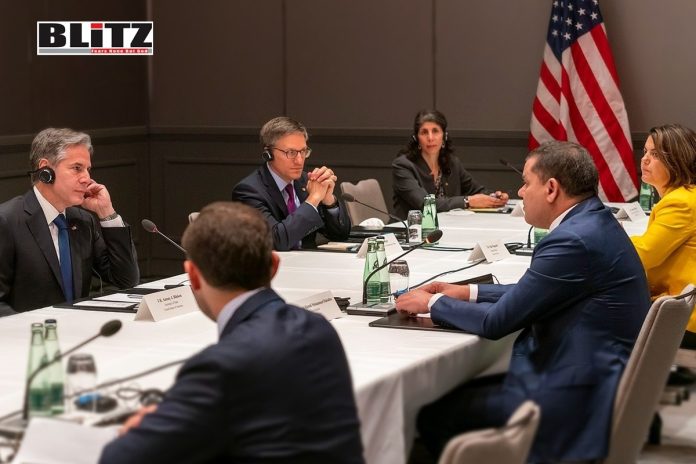Within the complicated mosaic of Libya’s political and safety panorama, the rise of hybrid armed teams as quasi-state actors presents a frightening impediment to the nation’s quest for stability, safety, and sovereignty. These teams, intricately woven into the material of Libya’s remaining useful establishments, have fostered governance fashions that prioritize private achieve over societal well-being, hindering progress in direction of a cohesive and affluent state. The convergence of political elites, illicit monetary programs, transnational prison networks, and closely armed factions, usually backed by overseas entities, has created a tangled internet of energy dynamics that perpetuate instability and impede the belief of a brighter future for Libya.
Amidst this backdrop, the cautious reentry of america onto the Libyan stage, epitomized by the appointment of a brand new ambassador, presents a glimmer of hope. But, it comes amidst a backdrop of previous missteps and failed interventions, together with ill-advised engagements with unsavory characters within the aftermath of Muammar Qaddafi’s demise. The current discount of US personnel in Niger and reviews of heightened Russian involvement in japanese Libya underscore the urgency for a recalibrated American diplomatic strategy.
With a purpose to successfully confront the rising affect of exterior actors and handle safety challenges within the area, america should implement a multifaceted strategy. As an alternative of continuous previous practices that inadvertently bolstered militia teams, Washington should shift its focus in direction of prioritizing the reconstruction of Libya’s fractured state establishments. This entails a concerted effort to dismantle the entrenched political economies that maintain armed nonstate entities, thus fostering an setting conducive to inclusive governance. By endeavor these focused initiatives, the US can lay the groundwork for a extra steady and equitable future in Libya, mitigating the affect of exterior forces and empowering the Libyan individuals to chart their very own course.
Central to this technique is the development of clear and honest monetary programs geared toward disrupting the illicit funneling of oil revenues to armed factions. Concurrently, america ought to pave pathways for people tempted by militia affiliation to discover different alternatives, whereas concurrently nurturing inclusive political discourse to weaken the affect of hybrid actors. Initiatives targeted on decentralization and strengthening native governance buildings maintain the potential to empower communities and curtail the resurgence of militia dominance. By endeavor these multifaceted efforts, a extra resilient and inclusive basis might be laid for sustainable peace and progress in Libya.
Furthermore, the overhaul of Libya’s safety sector stands as a cornerstone for fostering enduring stability. Earlier strategies, like train-and-equip initiatives, have fallen quick in rectifying systemic challenges inside the safety framework. Thus, a complete technique akin to the Democratic Republic of the Congo’s proactive disarmament, demobilization, and reintegration paradigm turns into crucial. This strategy not solely anticipates forthcoming peace accords but in addition harmonizes with overarching nationwide growth targets, all whereas staying delicate to the fluid sociopolitical panorama of Libya. Such a multifaceted technique holds the important thing to laying a stable basis for sustainable peace and prosperity within the nation.
Efforts at reform inside Libya have often been superficial, primarily motivated by inside energy dynamics quite than a complete imaginative and prescient for restructuring the safety sector. To attain significant progress, it’s crucial for the US and its Western allies to prioritize initiatives particularly tailor-made to Libya’s distinct context. This necessitates integrating safety sector reform with transitional justice mechanisms and state-rebuilding endeavors. By taking a holistic strategy that addresses the multifaceted challenges dealing with Libya, the worldwide group can foster sustainable change and contribute to long-term stability within the area.
By embracing a forward-looking outlook and acknowledging the inherently political dimensions of their actions, the US and its allies possess the capability to dismantle the hybrid teams deeply entrenched inside Libya’s political and financial realms. By way of deliberate and strategic engagement, they’ll successfully incentivize developments in direction of nationwide unity and socioeconomic growth. In doing so, they maintain the potential to mitigate political stalemates and facilitate the resurgence of Libyan sovereignty. This concerted effort represents an important step in direction of fostering stability and empowering the Libyan individuals to chart their very own course in direction of a affluent future.
Getting into a renewed section of US engagement in Libya necessitates a divergence from prior methodologies in direction of a nuanced and holistic strategy. By tackling the underlying drivers of instability and actively bolstering Libya’s journey in direction of inclusive governance, the US stands poised to exert important affect in sculpting a future characterised by stability and prosperity. Such efforts not solely profit Libya but in addition maintain the potential to positively impression the broader regional panorama, fostering cooperation and resilience within the face of shared challenges.
👇Observe extra 👇
👉 bdphone.com
👉 ultraactivation.com
👉 trainingreferral.com
👉 shaplafood.com
👉 bangladeshi.assist
👉 www.forexdhaka.com
👉 uncommunication.com
👉 ultra-sim.com
👉 forexdhaka.com
👉 ultrafxfund.com


